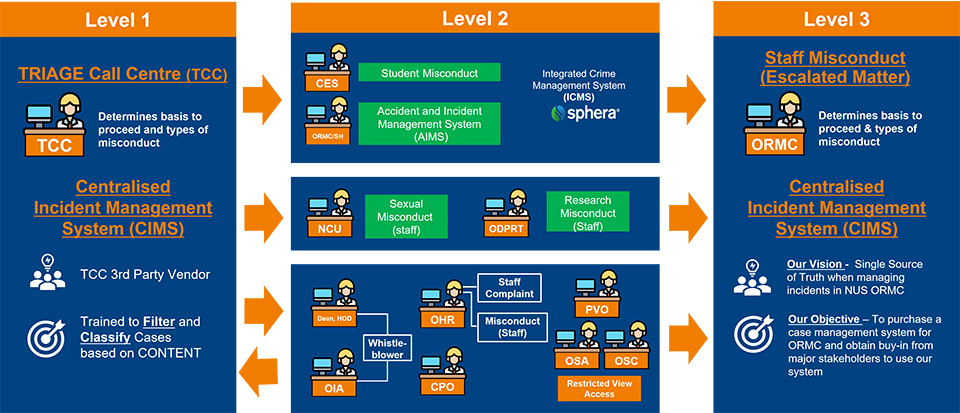Driven by NUS’ mission to maintain trust and confidence among students and the public, the NUS Whistleblowing Unit (WBU), under the purview of the Office of Risk Management and Compliance (ORMC), ensures that all staff uphold a high standard of integrity. An integral part of ORMC’s Compliance Unit, WBU provides a channel for the reporting of actual or suspected wrong-doings committed by any University staff, contract staff and contractors for investigation and corrective action, with the assurance that the whistleblower will be protected from reprisals for whistleblowing in good faith.
To improve the efficiency and effectiveness of the platform utilised by WBU, Project Triage – a centralisation and collaboration initiative was started in March 2021 to develop a more refined case management system.
Bringing Cases and Collaborations Together
Before Project Triage, a single whistleblowing report could be sent to multiple departments across NUS with no standardised process to decide who would be involved in investigations, how the case would be tracked and who would represent the University in providing a response. These issues were exacerbated in the event of “no-man’s land” and “many-man’s land” cases where reports fell under the purview of no or more than one department.
To prevent the dropping and duplication of cases and develop a single source of truth, ORMC launched the Centralised Incident Management System (CIMS) on 18 August 2021. The CIMS consolidates whistleblowing reports received by the WBU and other departments on a central digital platform and directs them to the right personnel for follow-up and progress updating.
“The idea is to have an inclusive rather than an exclusive system,” explained Dr Chan Tuck Wai, Head of the Compliance Unit, as he recounted his experiences pitching the idea of CIMS to various departments and attempting to find common ground for the necessary buy-in. 10 departments across NUS collaboratively utilise the CIMS, sharing and tracking cases with additional departments such as faculties and residences where necessary. “[This collaboration] cultivates a culture of multi-disciplinary participation to look into common issues and solving them together... with common values and agreed best practices,” added Cheong Sui Hunn, Assistant Senior Manager at the Compliance Unit.
In the first 10 months, a combination of more than 900 substantiated and unsubstantiated reports were received by the WBU, a scenario foreseen by the team and mitigated by the CIMS being able to allow departments to identify certain repetitive reports as spam and provide caution when managing such incidences.
 NUS Whistleblowing Unit’s process involves collaborations with multiple departments across the University to ensure a single source of truth.
NUS Whistleblowing Unit’s process involves collaborations with multiple departments across the University to ensure a single source of truth.
However, as Dr Chan pointed out, having a system was only half the solution. It was also crucial to figure out who was best suited to man the WBU’s emails and phoneline. The WBU decided to engage an external call centre to manage the contact points. The choice to utilise an external agency was a purposeful one as it “allocated certain functions to subject matter experts, rather than trying to reinvent the wheel...making the WBU process more robust, transparent and genuine in protecting the reputation of NUS,” commented Tony Yeow, Data Protection Officer at the Compliance Unit. The use of an external agency has also allowed the WBU to reduce time and manpower spent on filtering out junk and spam mail.
With the NUS community, for the NUS community
Looking ahead, the WBU aims to reach out to the NUS community to raise awareness of the whistleblowing platform and updated policy while simultaneously educating them on what can and cannot be reported upon. The plan, set to launch in the 3rd quarter of 2022, will develop a digital training programme and a short quiz to keep everyone better informed on the role of whistleblowing in the University. While the main aim of this initiative is to remind staff and students about the existence of a channel for them to air their grievances, the programme also has the potential to reduce the influx of irrelevant or unsubstantiated reports, resulting in a more efficient whistleblowing platform and process.
When it comes to maintaining ethical culture that is based on integrity as well as compliance with laws, regulations and standards, NUS is committed to stewarding resources responsibly and efficiently. As Dr Chan explains, “At the end of the day, everyone is getting a fair treatment; there is honour in the system. This is a responsible and accountable system, transparent to all.”
If you have a whistleblowing report to lodge, reach out to the NUS Whistleblowing Unit at whistleblow@nus.edu.sg or call +65 6516 6209.
Do you have your own OE Story to tell? We are inviting submissions of OE efforts across NUS! Please click on this link to find out more about the contribution guidelines and to submit your story.